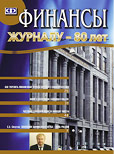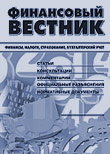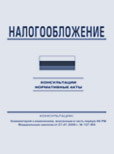Содержание
Актуально
E-mail: finance-journal@mail.ru
Обзор выступлений на расширенном заседании Коллегии, которое состоялось 20 апреля 2017 года.
К годовщине великой победы
О.А. Антонюк, доктор экономических наук, профессор Военного университета МО РФ
E-mail: pr.antonjuk@mail.ru
Ю.А. Лебедев, кандидат экономических наук, Военный университет МО РФ
Среди тех, кто с оружием в руках сражался с захватчиками в годы Великой Отечественной войны, находились и финансисты – счетоводы, бухгалтеры, финансовые инспекторы…
Среди Героев Советского Союза и полных кавалеров ордена Славы 392 финансиста. В статье – биографии и воспоминания о некоторых из них..
Финансы и бюджет: проблемы и решения
В.В. Левина, доцент Тульского государственного университета, член Экспертного совета «Всероссийского Совета местного самоуправления», кандидат экономических наук
E-mail: vvl2004@mail.ru
В статье рассмотрены перспективы применения различных видов целевых и нецелевых трансфертов из бюджета субъекта РФ в качестве инструмента социально-экономического развития муниципальных образований. На примере Тульской области выявлены проблемы, связанные с несогласованностью софинансируемых с помощью субсидий направлений, и приоритетов, заявленных в программных документах региона, неэффективностью распределения выравнивающих и стимулирующих дотаций, приводящей к недостаточно полной реализации их потенциала в качестве инструментов регионального развития. Сформулированы конкретные предложения для распределения каждой из форм межбюджетных трансфертов между муниципальными образованиями, ориентированные на обеспечение их социально-экономического развития.
Ключевые слова: межбюджетные трансферты, социально-экономическое развитие, муниципальные образования, дотации, субсидии.
E-mail: finance-journal@mail.ru
В Москве состоялись Пятые Васильевские чтения, обзор материалов которых приводится в редакционном материале.
Ключевые слова: общественные финансы, учебник, государственные и муниципальные финансы, технология платежных сервисов.
Казначейство: становление и развитие
С.А. Деребизова, заместитель руководителя УФК по Волгоградской области, кандидат экономических наук
Ю.И. Сидорова, старший казначей отдела внутреннего контроля и аудита
E-mail: ufk29@roskazna.ru
Федеральные органы исполнительной власти в Российской Федерации осуществляют свои функции на всей территории страны, что приводит к необходимости создания подразделений, выполняющих схожие функции. При наличии множества элементов одной системы возникает потребность в их упорядочивании, приведении к единой общей норме, стандарту. Наличие стандартов позволяет однозначно понимать цели и полученные результаты каждым участником процесса. Авторы рассматривают процесс стандартизации на примере контрольной деятельности в Казначействе России.
Ключевые слова: стандартизация, контрольная и аудиторская деятельность, структура управления.
E-mail: finance-journal@mail.ru
Информация об очередном заседании 27 апреля 2017 года.
Налоги: теория и практика
E-mail: finvestnik@mail.ru
Интервью с профессором
Виктором ван Коммером, директором Центра налогового права Амстердамского университета, членом совета директоров Международного центра налоговой документации (IBFD).
Ключевые слова: международная налоговая конкуренция, налоговая система, корпоративный налог.
Страхование
Э.С. Гребенщиков, кандидат исторических наук
E-mail: finvestnik@mail.ru
Статья посвящена анализу того, как ошибочные представления и устаревшие подходы, то есть субъективные факторы, препятствовали прогрессу российского страхового рынка. Они диктовались дефицитом знаний о функционировании глобальной экономики и международного страхового рынка (вместе со своей российской частью), о разработках МАСН и ОЭСР. В этом контексте автор останавливается на том, как воспринималась и интерпретировалась проблема открытия прямых филиалов зарубежных страховщиков в России. Описываются модели налогообложения деятельности страховых трансграничных филиалов и надзорного режима, применяемого к ним. Автор полагает, что форма филиала будет востребована крупными российскими страховщиками для работы не только на рынках стран ЕАЭС, но и в государствах дальнего зарубежья. Эта форма, несмотря на повышение нормативных к ней требований, повышает мобильность капитала материнской структуры и сокращает затраты. Данные соображения полезно учесть в ходе разработки законодательных норм, касающихся открытия и деятельности филиалов в России, мораторий на открытие которых в РФ истекает через несколько лет.
Ключевые слова: прямые филиалы, трансграничные отделения, капитализация отрасли, международные группы, ЕАЭС, Евросоюз, лицензионные требования.
А.Б. Знаменский, советник президента по развитию Российского союза автостраховщиков
E-mail: znamen@znay.ru
С.Б. Богоявленский, доцент кафедры банков, финансовых рынков и страхования СПбГЭУ, кандидат экономических наук
E-mail: actuar@mail.ru
Активно обсуждаемая идея либерализации тарифов по обязательному страхованию гражданской ответственности владельцев автотранспортных средств (ОСАГО) во многом является вынужденной мерой, направленной на сглаживание противоречия между социальным характером обязательного страхования и рыночным способом его реализации. Авторы излагают несколько вариантов осуществления данной идеи, предоставляющих страховщикам разную степень свободы. Предпочтительной с их точки зрения является раскрываемая ими «частичная качественная либерализация». Наряду с ожидаемым положительным эффектом авторы указывают на ряд опасностей, которые должны быть учтены профессиональным сообществом и регулятором при разработке нормативных и методических документов, обеспечивающих переход рынка ОСАГО на свободное ценообразование.
Ключевые слова: регулирование обязательного страхования, тарифы, коэффициенты, ОСАГО, либерализация.
Т.А. Плахова, зам. зав. кафедрой «Ингосстрах» Финансового университета при Правительстве РФ, доцент, кандидат экономических наук
E-mail: znamen@znay.ru
И.В. Кузьмич, магистрант Финансового университета при Правительстве РФ
E-mail: TAPlakhova@fa.ru
Необходимость надежной страховой защиты сельхозпроизводства более чем очевидна. Появление земельных собственников выявило новые имущественные интересы в сфере землепользования, а демонополизация страхового дела позволила говорить о предоставлении страховой защиты за счет страховых фондов, формируемых страховщиками. В настоящее время на рынке агрострахования функционируют десятки страховых компаний, однако объекты страхования и объем страхового покрытия остались, по сути дела, те же, что и прежде, пишут авторы статьи. Сама земля по-прежнему не рассматривается как объект страхования, хотя общая ситуация с рисками в стране негативно влияет на состояние этого фактора производства. Причем наряду с негативными природными явлениями существенное воздействие на порчу земли стали оказывать техногенные факторы. Приводятся данные об ухудшении состояния земельных угодий как рискового фактора.
Ключевые слова: страхование земли как производственного фактора, рынок агрострахования, техногенное загрязнение, комплексное страхование земельных участков.
Мнения
В.М. Юровицкий, МФТИ, кандидат экономических наук
E-mail: v.yurovitsky@mail.ru
В настоящее время проблема «безналичного общества» (cashless society) стала весьма актуальной. Многие страны уже приблизились к этому или даже стали таковыми де-факто.
Проблема создания «безналичного общества» обсуждалась в России еще в девяностых годах прошлого века. В Государственную Думу в 1996 г. был внесен законопроект: «О трансформации денежной системы Российской Федерации», согласно которому предлагалось постепенное исключение наличного денежного обращения из сферы денег. В статье предлагается усовершенствованный путь перехода России в безналичное общество.
Ключевые слова: «безналичное общество», наличные деньги, денежная система.
Корпоративные финансы
А.Н. Сухарев, доктор экономических наук, профессор кафедры конституционного, административного и таможенного права Тверского государственного университета
E-mail: su500005@yandex.ru
В статье раскрыта проблема несовершенства финансовой модели деятельности управляющих компаний в сфере ЖКХ. Предложено увеличение минимального уставного капитала управляющих компаний в зависимости от количества квадратных метров обслуживаемых ими помещений.
Ключевые слова: управляющая компания, ресурсоснабжающая организация, жилищно-коммунальные платежи, уставный капитал, оборотный капитал.
Финансы зарубежных стран
E-mail: finvestnik@mail.ru
В материале описываются основные направления и ход реформ в налоговой сфере в Индии, где только 2,4 млн. жителей подали декларации о своих доходах за 2016 г., при том, что гораздо большее число имеют доход, превышающий пороговое значение в 1 млн. рупий. Центральное правительство и министерство финансов предпринимают шаги для вывода значительной части экономики из тени, расширяя «налоговую сеть». Разрабатываются детали плана перехода к единому общефедеральному НДС; в центре дискуссии – вопрос о размере ставки НДС. Сделаны шаги в сторону демонетизации делового оборота (переходу на безналичные расчеты), что должно повысить собираемость налогов.
Ключевые слова: налогоплательщики с высокими доходами, налоговая информация, единый налог на торговлю и услуги, федеральный НДС, демонетизация делового оборота, налоговое администрирование.
Научные исследования аспирантов и соискателей
Т.Э. Новикова, аспирант департамента налоговой политики и таможенно-тарифного регулирования Финансового университета при Правительстве РФ
E-mail: Mns11906@nalog.ru
В статье рассматривается воздействие акцизного налогообложения табачной продукции на экономические и социальные процессы в современном обществе, его вклад в доходы бюджета. Излагаются основные приоритеты государственной политики в области налогообложения табачных изделий. Автор приводит аргументы в пользу перехода от смешанной системы налогообложения табачной продукции к специфической ставке акциза как к более перспективному направлению развития регулирования и администрирования акцизного налогообложения табачных изделий.
Ключевые слова: адвалорная ставка акциза, специфическая система налогообложения, гармонизация налоговых ставок, контрабандный и контрафактный продукт.
Annotation
E-mail: finance-journal@mail.ru
Review of speeches at the enlarged Board meeting held on 20th of April 2017.
O.A. Antonjuk, professor of the Military University of the Defence Ministry of the Russian Federation, doctor of economic sciences
E-mail: pr.antonjuk@mail.ru
Y.A. Lebedev, candidate of economic sciences, Military University of the Defence Ministry of the Russian Federation
Among those who fought against the invaders with arms in hands during the Great Patriotic War there were financiers - bookkeepers, accountants, financial inspectors.
There were 392 financiers among the Heroes of Soviet Union and full cavaliers of order of Glory. Article contains the biographies and memories about some of them.
V.V. Levina, associate professor of the Tula State University, member of Expert Council “All – Russian Council of local selfgovernment”, candidate of economic sciences
E-mail: vvl2004@mail.ru
The article examines the prospects of applying various types of the transfers from the regional budget as tools for the development of municipalities. On the example of the Tula region there are given main problems of regional development using the various types of the transfers like the inconsistency of directions co-financed by subsidies and priorities stated in the program documents of the region, ineffectiveness of distribution of equalizing and stimulating grants. In the article are suggested the specific proposals for the distribution of each of the forms of transfers for municipalities, aimed at ensuring their social and economic development.
Keywords: interbudgetary transfers, social and economic development, municipalities, grants, subsidies.
E-mail: finance-journal@mail.ru
“The Fifth Vasilievskie readings” was held in Moscow, editorial article provides the review of materials.
Keywords: public finances, textbook, state and municipal finance, technology of payments services.
S.A. Derebisova, deputy head of Administration of the Federal Treasury across the Volgograd region, candidate of economic sciences.
Y.I. Sidorova, senior treasurer of the Department of Internal control and audit
E-mail: ufk29@roskazna.ru
Federal bodies of executive authorities in the Russian Federation implement their functions throughout the country that leads to creation of units that perform similar functions. Availability of great number of elements in one system creates the necessity of their arrangement, bring them to single general norm, standard. Availability of standards allows each participant of the process to clearly understand the objectives and obtained results. Authors consider the process of standardization on the example of the control activities of the Treasury of Russia.
Keywords: standardization, control and auditing activities, structure of management.
E-mail: finance-journal@mail.ru
Information about the regular meeting passed on 27th of April 2017.
E-mail: finvestnik@mail.ru
Interview with professor Victor van Kommer, director of Center for Tax Law of the University of Amsterdam, member of the Board of Directors of International Bureau of Fiscal Documentation (IBFD).
Keywords: international tax competition, tax system, corporate tax.
E.S. Grebenshchikov, candidate of historical sciences
E-mail: finvestnik@mail.ru
The article is about how misperceptions, and, to put it simply, ignorance hindered the development of insurance market in post-reform Russia. The deficit of knowledge about how world insurance market functions and how transborder operations are regulated led to the near panic when the issues of Russian membership in WTO and opening of direct branches emerged. In reality WTO membership hardly influenced in any considerable degree the development of the Russian insurance market and presented no menace to the national control over the market. Other uncontemplated problems hit the Russian insurance business like failures in MTPL, deficit of capital and exit of some major global insurers from Russia leaving domestic carriers alone in confronting new issues. Dr Grebenshchikov reminds that 9 year moratorium on opening of foreign branches in Russia is running out and proper amendments into national legislation are to be made. It should be taken into account that Russian major insurance carriers may require the form of branches to promote their activities in near abroad (Euroasian economic union) union and other countries as well. OECD guidelines and interaction of RF with this organization are extremely useful in this regard.
Keywords: insurance legislation, host country, WTO, OECD, IAES, transborder operations, reinsurance, direct branches, branch taxation and profit attribution, inflow of capital.
A.B. Znamensky, adviser to the President on development of Russian Union of Car insurers.
E-mail: znamen@znay.ru
S.B. Bogoyavlensky, associate professor of chair “Banks, financial markets and insurance” of the St. Petersburg State University of Economics, candidate of economic sciences
E-mail: actuar@mail.ru
Actively discussed idea of liberalization of tariffs on compulsory insurance of MTPL (OSAGO) largely is a forced measure aimed at smoothing the contradictions between social character of a compulsory insurance and market way of its realization. Authors describe several options for implementation of this idea, providing different degree of freedom to insurers. From their point of view “partial qualitative liberalization” revealed by them is the most preferable. Along with the expected positive effect, authors indicate a number of risks that should be considered by the professional community and regulators during the development of normative and methodological documents ensuring the transition of MTPL to free pricing.
Keywords: regulation of compulsory insurance, tariffs, coefficients, MTPL, liberalization.
T.A. Plakhova, deputy head of chair “Ingosstrakh” of the Financial University under the Government of the Russian Federation, associate professor, candidate of economic sciences
I.V. Kuzmich, student of magistracy of the Financial University under the Government of the Russian Federation
E-mail: TAPlakhova@fa.ru
The necessity of reliable insurance protection of agricultural production is more than obvious. The appearance of land owners identified new property interests in the sphere of land use and de – monopolization of the insurance business permitted to talk about the provision of insurance protection at the expense of insurance funds formed by insurers. Authors wrote that currently a dozens of insurance companies operate on the market of agricultural insurance, however the objects of insurance and volume of insurance coverage remained essentially the same as before. The land itself still is not considered as the object of insurance, although the overall situation with risks in country negatively affects the condition of this factor of production. Along with negative natural events, technogenic factors began to have significant impact on deterioration of the land. Article provides data about the deterioration of conditions of the land as risk factors.
Keywords: insurance of land as production factor, market of agricultural insurance, technogenic pollution, comprehensive insurance of land.
V.M. Yurovitsky, Moscow Institute of Physics and Technology, candidate of economic sciences.
E-mail: v.yurovitsky@mail.ru
Currently the problem of “cashless society” became very relevant. Many countries became closer to it or even became such de – facto.
The problem of “cashless society” was discussed in Russia in the nineties of the last century. Draft law “About the transformation of monetary system of the Russian Federation” was introduced to the State Duma in 1996, which proposed gradual exclusion of cash circulation from sphere of money. Article proposes improved way of Russia’s transition to a cashless society.
Keywords: “cashless society”, cash, money system.
A.N. Sukharev, doctor of Economic Sciences, professor of constitutional, administrative and customs law of the Tver State University.
E-mail: sи500005@yandex.ru
In article the problem of imperfection of financial model of activities of managing companies in housing sector is revealed. Increase in the minimum authorized capital of managing companies depending on the number of square meters of the rooms served by them is offered.
Keywords: managing company, resource supplying organization, housing-and-municipal payments, authorized capital, working capital.
E-mail: finvestnik@mail.ru
India is often described by its own politicians and experts as non-tax compliant society. Only 2,4 mln. persons filed their tax returns for 2016 with far greater number having income exceeding official threshold of 1 mln. rupees. The Central government and Ministry of Finance took steps to broaden the tax network and reduce the sector of “black money” in the Indian economy by introduction of unified federal VAT (the rate is being discussed) and demonetization of business turnover. The new law on goods and services tax (GST) is being contemplated .
Keywords: taxpayers with high income, tax information, single tax on trade and services, federal VAT, demonetization of business turnover, tax administration.
T.E. Novikova, postgraduate student of department “Tax policy and customs tariff regulation” of the Financial University under the Government of the Russian Federation.
E-mail: Mns11906@nalog.ru
The article examines the impact of tobacco taxation on economic and social processes in modern society. The main priorities of the state policy in the field of tobacco taxation are studied. The transition from a mixed taxation system to the specific excise rate is defined as a perspective direction in the development of tobacco tax regulation and administration.
Keywords: ad valorem rate of excise, specific system of taxation, harmonization of tax rates, contraband and counterfeit product.













